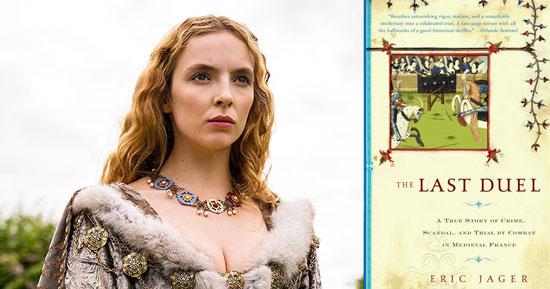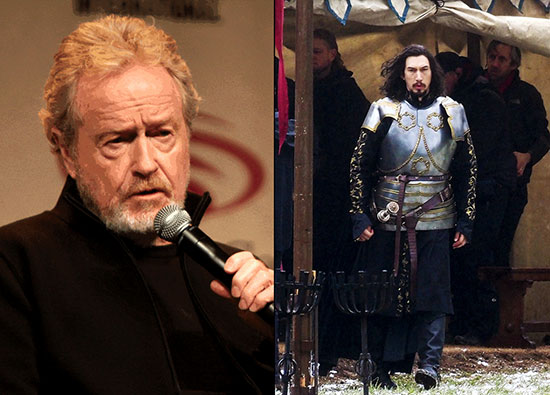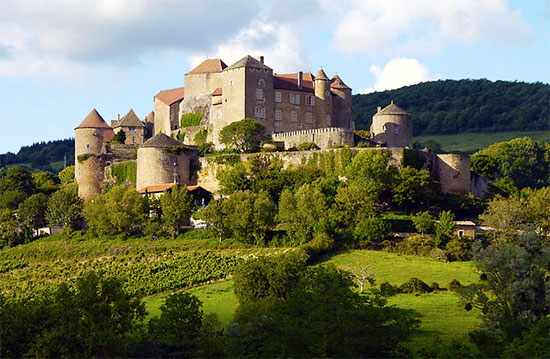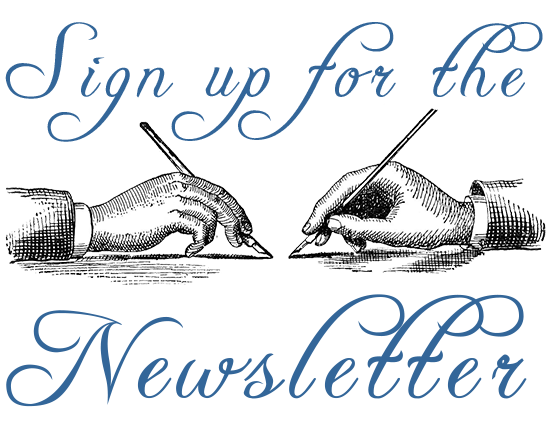Last Updated on May 2, 2020
Around one percent of books are optioned for film or television, and only one percent of those titles ever make it to production.
Eric Jager, author and English professor at UCLA, had no idea of the very long odds, or of the interminable delays, when, more than twenty-five years ago, he first came across the historic true story of a late 1300s knight, squire and lady, and thought, “This would make a great movie!”

To help keep this site running: Willow and Thatch may receive a commission when you click on any of the links on our site and make a purchase after doing so.
Now, their tale is being made into a period drama starring Jodie Comer (The White Princess), Ben Affleck (Shakespeare in Love), Matt Damon (The Talented Mr. Ripley), Harriet Walter (Belgravia), and Adam Driver (Marriage Story), based on Jager’s non-fiction book The Last Duel.
Below, Jager shares how his interest in the medieval scandal led him on a quest of his own, leading him to write The Last Duel.
“At that time there was much talk in France, and as far as the most distant parts of the kingdom, of a duel to the death which was to take place in Paris following a decision of the High Court….”
Thus the chronicler Jean Froissart begins his tale of a sensational trial by combat on a cold December morning in 1386, at a field of battle laid out behind an old priory, as the king of France and an eager crowd of many thousands watch. The Norman knight Jean de Carrouges had accused the squire Jacques Le Gris of having raped the knight’s young and beautiful wife Marguerite de Carrouges.
If Marguerite’s champion won the duel and killed his opponent, she would go free. But if he were slain, she, too, would pay with her life for having sworn a false oath.
When I first stumbled over the extraordinary true story of the knight, the squire and the lady more than twenty-five years ago, I was struck by the story’s raw emotional power and spectacular visual appeal. Despite taking place in the Middle-Ages, it resonated with things that still excite people today: honor and revenge, suffering and courage, villainy and heroism.

Instantly fascinated by the story, I wanted to know more. Did the alleged crime really occur? Was Le Gris really guilty? Had Marguerite told the truth? Did other accounts of the case survive? The chronicler’s few pages obviously left out many details, so I began to do some research.
I soon discovered that the Carrouges-Le Gris duel was notorious in French history as a supposed miscarriage of justice. The thorny “he said, she said” case had also changed the law in France.
It was the last time the Parlement of Paris (the chronicler’s “High Court”) had ever ordered a public judicial duel to resolve a case of alleged rape, helping to abolish trial by combat and ushering in an age of private, illegal duels.
I also learned that many key documents had survived, including the Parlement’s detailed summary of the case, the legal notes left by one of the attorneys, and assorted family records. And yet to my surprise, no one had ever published a full-length account of the affair. If I wanted a book about the 1386 case, it looked as though I would have to write it myself.
Captivated by the story and the controversy, I began collecting everything I could find about the affair. The primary sources — including several other chronicles — did not always agree, and some included wild inaccuracies about names, places and other details. Eventually, in the French archives, I would learn that even the published transcripts of the original documents contained significant errors and omissions passed down from one to the next.
Digging into the layers of accumulated material, sifting through the often contradictory accounts, I tried to get to the bottom of things, to find out what had really happened back in 1386. I began doubting the consensus view that it all had been a case of mistaken identity. I grew skeptical of the oft-repeated idea that Le Gris was actually innocent and that Marguerite had accused him “in honest error.”
An alternative version of the story gradually took shape in my mind. Eventually I began drafting parts of the book that became The Last Duel: A True Story of Trial by Combat in Medieval France.
Like a medieval quest, my attempt to understand the Carrouges-Le Gris affair was a new and exciting adventure but one also filled with uncertainty. I was not sure what I might find or where the journey would lead. It would take me across the Atlantic Ocean and over the English Channel into what for me was largely foreign territory: the terra incognita of medieval France and one of its most puzzling and enduring mysteries.
On separate trips abroad, I would eventually spend nearly a month and a half working in the archives. I would also delve into many areas that I had hardly explored until then, including medieval arms and armor, castles and fortifications, the history of Normandy, the Hundred Years’ War, the streets and palaces of medieval Paris, the people and pageantry of the French royal court, the difficult lives of medieval women, the bizarre laws about rape in medieval France, and of course the ancient rules and rituals of judicial combat.
Well into my work, I would even take some fencing lessons from a feisty Ukrainian emigré at the Beverly Hills Fencing Club to get a better sense of what it was like to experience hand-to-hand combat with a bladed weapon. Not least important, I would also visit many places in Normandy connected with the story, where some of the family names still appear on maps today and where the bloody affair is still remembered like an old family tragedy.

Visiting the regional towns and estates where the characters had lived, the rural landscapes through which they had traveled, I tried to capture that elusive sense of what it was like to be there six hundred years ago.
Following the routes that the knight, the squire and the lady had travelled to Paris, I also saw what remained of the shrines and palaces where the final scenes of the drama had unfolded, including the old priory where the duel had been fought on that cold winter morning so long ago.
My quest would lead to many discoveries and not a few surprises. And my adventure would continue long after the book was published. For I had no idea at the start how my attempt to bring this remarkable story back to life on the page would stir many other imaginations as well.
Now the world-renowned director Ridley Scott and a talented team of writers, actors, producers, and crew are adapting that story to the big screen as the period drama “The Last Duel.” Real people living almost legendary lives have been resurrected from history by the alchemy that is Hollywood. And events that were the talk of the kingdom, according to the chronicler Froissart, will resonate for an even larger public with issues and controversies that still stir us today.
Eric Jager is a professor of English at UCLA and the author of four books, including The Last Duel and Blood Royal. The feature film based on “The Last Duel” is scheduled to be released in 2021.
Be sure to see The Period Films List, with the best British, historical and costume dramas sorted by era. You’ll also want to see our list of Strong Women in Period Dramas.

